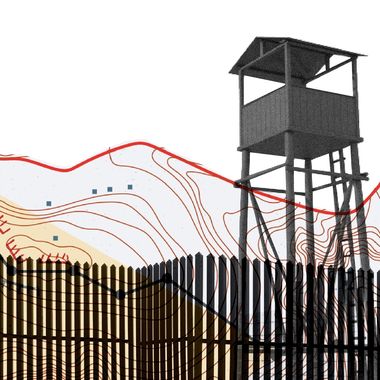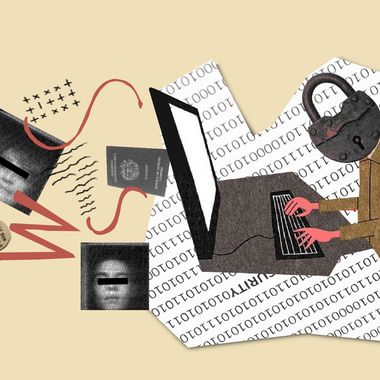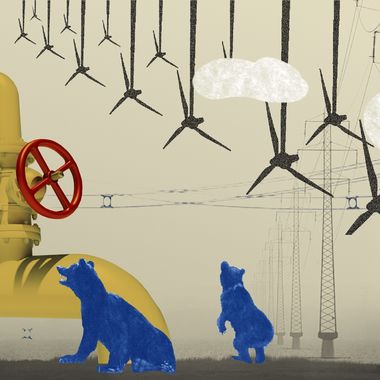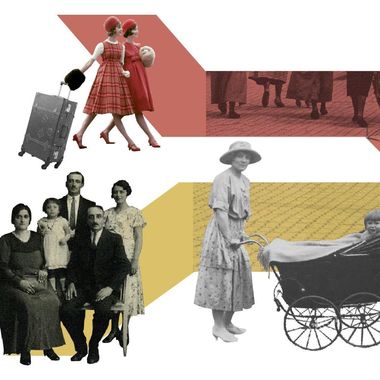Mon Mar 01 2021 · 9 min read
On the Current Role of the Armed Forces and Civil Society in the Political Situation in Armenia

By Sossi Tatikyan
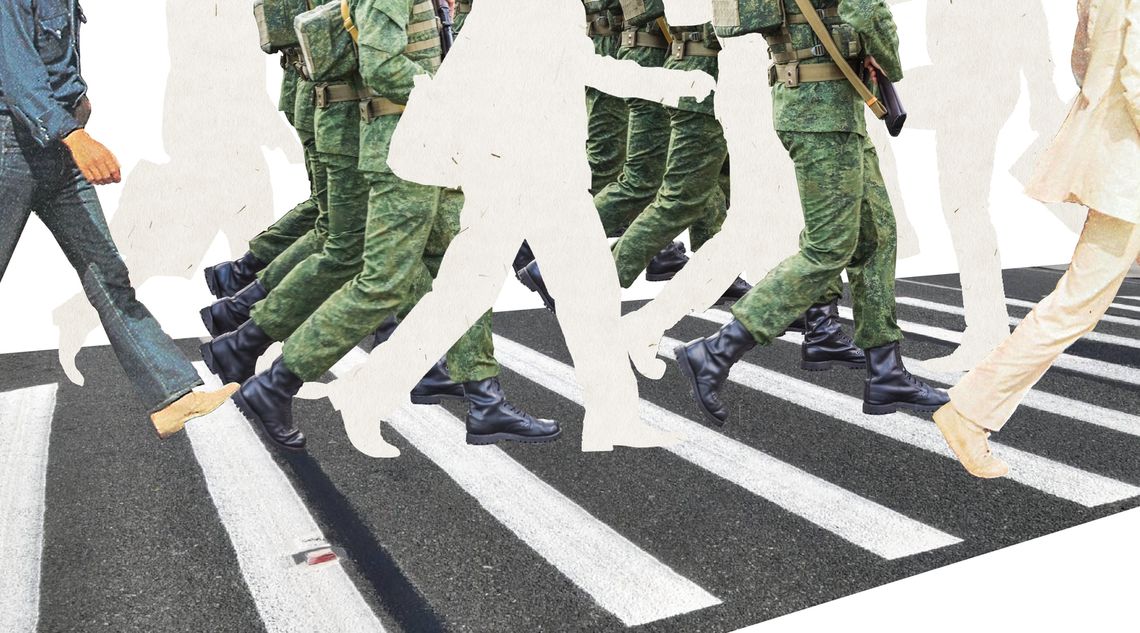
Illustration by Armine Shahbazyan.
The Constitution of the Republic of Armenia stipulates that the Armed Forces must ensure the security, defense and territorial integrity of Armenia, as well as the inviolability of its borders. According to the Constitution, the armed forces must maintain neutrality in political matters and be under civilian control. Unlike the constitutions in a number of other countries, Armenia’s Constitution does not define the functions of the police and the National Security Service. As a rule, the functions of the police are to protect the rule of law, public order and the property of citizens and the state.
The OSCE’s Code of Conduct on Politico-Military Aspects of Security adopted in 1994, emphasizes the demand for political neutrality of the armed forces; prohibits the use of force to restrict the peaceful and legal exercise of human and civil rights within the country. It also defines the conditions governing the use of force within the country, such as constitutionality, the rule of law during operations, the proportionality of the use of force, the need not to harm citizens or their property. The OSCE’s Office for Democratic Institutions and Human Rights’ (ODIHR) Handbook on Human Rights and Fundamental Freedoms of Armed Forces Personnel sets out the responsibility and individual accountability of Commanders for improper or illegal orders that violate state law, and that therefore are considered a crime.
There is no explicit intention of carrying out a military coup in the statement that was issued by the General Chief of Armenia’s Armed Forces and 40 other high-ranking military personnel on February 25. However, the interference of the armed forces in the political process is a violation of the principle of political neutrality and civilian control over them. It is important to note that the experience of other countries illustrates that a military coup is usually carried out and not solely announced without accompanying actions. The latest example of a military coup occurred in Myanmar a month ago.
It is noteworthy that although the UN, the European Union, the Parliamentary Assembly of the Council of Europe (PACE), NATO and the US State Department expressed concern over the situation in Armenia, they did not use the term “military coup” but rather pointed out the importance of the principle of political neutrality of the armed forces and civilian control over them.
Chaos of Legal Terminology
We have created confusion with legal terminology since the start of the war on September 27, and it is deepening now.
Let's start with the fact that in the English translation of the Constitution, “military situation” [ռազմական դրությունը] is incorrectly translated as "martial law.” The latter means direct military control, supremacy of military authorities over civilian authorities, the suspension of civil legislation in the event of war or military threat. In the last several decades, this has come to have a negative connotation in democracies. The use of this inaccurate term about Armenia has been circulated in the local and international press since the beginning of the Second Nagorno-Karabakh war and in reports by international organizations. In reality, even during the 44 days of the war and in its aftermath, the civilian authorities have been in charge and have overseen the actions of the armed forces.
Another legal chaos was created by the attempt to explain the February 25 statement by the 40 senior military officers referring to the military situation (translated to “martial law”). The active phase of the war is over, but that legal regime continues to be maintained, although most restrictions under it have been eased or eliminated since the beginning of December 2020.
According to Article 119 of the Constitution, “martial law” (should be “military situation”) is applied in the event of an armed attack, its imminent threat or in the case of a declaration of war, and includes a general or partial mobilization, while general mobilization was halted in Armenia after the first few days of the war.
The military situation currently in place should not be intended to resolve internal security or political problems, but should rather aim to address or resolve issues of external security and defense challenges. According to Article 120 of the Constitution, another legal regime - a state of emergency is envisaged to address internal security issues that was controversially applied to prevent the spread of the COVID-19 pandemic for the duration of six months and was replaced by a quarantine that is formally continuing until now. The state of emergency is intended for an imminent threat to the constitutional order. Both the military situation/“martial law” and the state of emergency are declared by the government and once it is declared, a special session of the National Assembly is immediately convened. The National Assembly can lift the state of emergency by a majority vote or cancel the implementation of measures envisaged by the legal regime of the state of emergency.
Delineation of the Functions of the Army and Police
In the last decade, the principle of delineation of the functions of the army and police has been included in UN documents. The army and the police have different functions and receive different education and training. Involvement of the army in restoring public order and internal security may be required during terrorist attacks, military uprisings or violent riots. However, in those events, the army must not be in charge of the situation; it must remain under civilian oversight, on the second line and support the police. The army’s active intervention must be implemented as a last resort and only in extreme cases, for example when the police, civilians or public institutions are subjected to an armed attack or extreme violence and the police are no longer able to resist or maintain the situation. Even in the case of active intervention, the actions of both the army and the police must be proportionate to the violence perpetrated by insurgents or demonstrators. It is necessary to avoid the use of excessive force, especially the use of lethal weapons that could result in casualties.
Examples of the Army’s Participation in Political Developments
Nevertheless, in different countries, the army or its different units, as well as the police, have reacted differently to different internal political developments, largely determining the outcome of uprisings, revolutions and protests, as was the case during the Arab Spring. Leaders of different African states have come to power through military coups (e.g. presidents of the Central African Republic until 2015 and Gambia until 2016). A number of leaders of some countries who have been in office for many years have been removed from power through direct or indirect military intervention (e.g. the 2017 military coup in Zimbabwe; and the army’s intervention during the Egyptian revolution in 2011). Such developments are usually criticized by the international community, with rare exceptions. The most obvious of the latter is the case of Zimbabwe, where the ouster of Robert Mugabe through a military coup, who ruled for thirty years and led the country to collapse, was welcomed both at home and abroad. Even if in the short-run any force retains power or comes to power through the use of the army, it leads to long-term problems: the legitimacy of the authorities and the international reputation of the country suffers, development is stunted, there is a slowdown in reforms and they are subjected to isolation and sanctions. Later, a problem of responsibility arises, especially if disproportionate force is used, as a result of which citizens are killed.
Divergent Positions Within Different Forces or the Same Force
Differing positions of different forces in a country (i.e. the army, police, or national security) on political developments in the country, or different political orientations within the same force, can lead to clashes between them or a civil war. During the 2006 crisis in Timor-Leste, there was on the one hand, a split in the army (Eastern and Western Timorese, and the dominance and discriminatory attitude of the former towards the second group); and on the other hand, between the majority of the army and the police (independence freedom fighters and supporters of integration with Indonesia). Moreover, senior officials of the defense system had allegedly distributed weapons to some civilians. Accompanied with the controversy between the country's president and prime minister, this led to a two-month crisis that saw the killing of dozens of people and the destruction of many buildings and homes, and which resulted in the resignation of the president. Two years later, the same military commander attempted to assassinate the next president, resulting in his own death. These two episodes not only slowed down the normal development of the country and the planned reforms of the army and police but also resulted in the deployment of military components of four regional countries, aside from the UN peacekeeping mission, in order to stabilize the situation in the country.
It should be noted that according to Articles 5 and 15 of Armenia’s Law on Defense, during the military situation/“martial law” or during war, other troops, i.e. police forces, border troops, state security service and special units of the National Security Service, civil protection, emergency situations, move under the operative subordination of the military command of the armed forces.
As a general principle, both the army and the police should be politically neutral. They should not be instrumentalized neither for maintaining the power of the governing elite nor for its replacement with another by the opposition.
The Danger of Diverting the Attention of the Army From Defense Issues
In the case of Armenia, the involvement of the army in domestic politics may lead to diverting the attention of the soldiers in military positions and in turn, increase threats against the country’s defense structure. Active hostilities in Nagorno-Karabakh have ended, however, the ceasefire truce was already violated on December 12-13, 2020 and the security situation in Nagorno-Karabakh and also Armenia’s southern Syunik region remains fragile; there are serious border and human security issues in border regions. The security of Armenia’s border is not ensured. Moreover, Armenia’s state border has increased by 500 kilometers.
In addition, given the failure to prevent the war through diplomacy, the ensuing military defeat and the enormous impact this has had in all spheres, it is incumbent upon all sides to stop avoiding responsibility, and instead of blaming the other side and looking for scapegoats, to launch an in-depth analysis of the reasons for all this, to confront the truth, to draw lessons, and to initiate and implement radical reforms. If appropriate/necessary, a Truth and Reconciliation Commission could be established with the participation of all previous and present authorities as a positive mechanism of transitional justice.
Polarization and Marginalization in Armenian Society
Armenia’s society is not black or white. Aside from the two main poles - supporters of the current ruling My Step faction and supporters of the opposition Homeland Salvation Movement, as well as the smaller National Democratic Axis (“Sasna Tsrer” supporters), there is a large number of citizens who do not associate themselves with either of these factions. They are disillusioned by all of them, they are undecided, they associate with one of the smaller political parties or are waiting for the development of a new alternative. They are not coming out into the streets, and the number of citizens forming subgroups is unknown. One of these subgroups is civil society, which used to take part in demonstrations and movements, but is not on the streets because that space is now occupied. On the one hand, this part of Armenian society feels neglected, alienated and marginalized by the authorities. On the other hand, this group is associated with the authorities, labeled and targeted, at least at the level of hate speech, by the opposition Homeland Salvation Movement. This group expresses its position through statements and proposals, constructively criticizing the authorities and by taking upon itself a number of functions which the government has not been able to implement effectively and is demanding snap elections, more accountability and transparency by the authorities.
This degree of polarization indicates that ignoring the severity of the crisis may escalate it further, and maintaining the status quo is not sustainable and may make the situation more volatile and explosive.
Indeed, the people must make their own decision. But the people are not only those who have taken to the streets to support one side or the other. The people are also that majority who remain at home. And the people must express their will not on the streets, but through elections, as is envisioned in the Constitution of Armenia.

The January 2021 issue of EVN Report's Magazine, entitled "Security," covers a wide spectrum of security concerns facing Armenia, from energy security to physical security to food security and beyond. Armenia has a maximum of five years, the period in which Russian peacekeepers will be deployed in Artsakh, to reconfigure it's security architecture.
Armenia’s New Security Architecture: Russia as Geopolitical Bodyguard
By Nerses Kopalyan
Armenia needs to reconfigure the political economy of its security architecture by utilizing its security alliance with Russia, through a mechanism of burden-sharing, where Russia’s geopolitical interests are aligned with Armenia’s security interests.
The Cyber Battlefield is Just as Important: Armenia’s Cybersecurity
By Artur Papyan
The scale and level of coordination of cyberattacks by Azerbaijani hackers in 2020, indicates careful planning and centralized coordination. Artur Papyan writes about the need for education about cybersecurity in Armenia, in both the private and public sectors.
Armenia’s Food Security
By Lusine Sargsyan
In a world where pandemics, extreme climatic phenomena and natural disasters are becoming more common, the issue of food security is a global challenge of increasing importance. Armenia is not immune to these developments.
Laying Off the Gas: Energy Security in Armenia
By Yelena Vardanyan
Diversifying Armenia’s energy sources is a strategic need of national importance. The coming decade presents an opportunity to turn direction and tackle the considerable obstacles facing the country. Strong political commitments and a focused approach are needed to make real progress.
Armenia’s Environmental Security
By Irina Ghaplanyan , Erik Grigoryan
Armenia has an incredible potential to tap into its natural resources sustainably and moreover ensure green economic growth. What is needed is visionary thinking as well as effective, professional and technocratic governance.
Avoiding the Empty Nest: Armenia’s Demographic Security
By Hovhannes Nazaretyan
Armenia’s significant demographic decline over the past 30 years due to emigration and declining birth rates has affected nearly all areas of life in the country from industry to education to the military.

